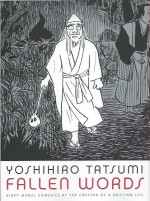
By Yoshihiro Tatsumi, translated by Jocelyne Allen (Drawn & Quarterly)
ISBN: 978-1-77046-074-4
After half a century of virtual obscurity, crafting brilliantly incisive and powerfully personal tales of modern humanity on the margins and on the edge, Yoshihiro Tatsumi found “overnight success†with his glorious autobiographical work A Drifting Life in 2009.
To describe his dark, bleak vignettes of raw real life, Tatsumi devised the term Gekiga or “dramatic picturesâ€, practically if not actually inventing the genre of adult, realistic, socially aware and literary comics stories in Japan. He began his career at a time when sequential narratives or “manga†literally meant “Irresponsible†or “Foolish Picturesâ€; a flashy and fanciful form of cheap, escapist entertainment targeted specifically at children – and the simple-minded – in the years immediately following the cessation of hostilities.
His tales have continued, in a never-ending progression, to detail the minutiae and moment of Japanese popular culture and, with his star assured in the manga firmament, have turned to a far older aspect of his country’s artistic heritage for this project.
The traditional performance art of Rakugo seems to combine many elements British observers would quickly recognise: reverentially combining familiar tales told many times over such as morality or mystery plays with instructive fables and especially shaggy dog stories and, just like Christmas pantomimes, the art derives from how the story is revamped, retold and expressed – but the ending is sacrosanct and must always be delivered in its purest, untrammelled form…
Developing out of the far older Karukuchi and Kobanashi shows, Rakugo first appeared as a discrete performance style accessible to the lower classes around 1780 during the Edo Period, establishing itself as a popular entertainment which still thrives today, regarded as a type of intimate comedy drama act in Vaudeville theatres.
As with all Japanese art-forms and disciplines Rakuga is highly structured, strictured and codified, with many off-shoots and sub-genres abounding, but basically it’s a one-man show where a storyteller (Rakugoka or Hanashika) relates a broad and widely embellished tale of Old Japan, acting all the parts from a sitting position, with only a paper fan (Sensu) and hand-cloth (Tenegui).
Equal parts humorous monologue, sitcom and stand-up act (or more accurately “kneel-down comedyâ€, since the Rakugoka never rises from the formal Seiza position) the crucial element is always the delivery of the traditional ochi or punch-line; inviolate, eagerly anticipated and already deeply ingrained in all audience members…
As is only fitting these tales are presented in the traditional back to front, right to left Japanese format with a copious section of notes and commentary, plus an ‘Afterword’ from Mr. Tatsumi, and I’d be doing potential readers an immense disservice by being too detailed in my plot descriptions, so I’ll be both brief and vague from now on…
‘The Innkeeper’s Fortune’ relates the salutary events following the arrival of an immensely rich man at a lowly hostel, and what happens after, against his express desires, he wins a paltry 1000 ryo in a lottery whilst the ‘New Year Festival’ only serves to remind one reluctant father what a noisome burden his rowdy ungrateful son is…
An itinerant young artist can’t pay his inn bill and, as a promissory note, paints a screen with birds so lifelike they fly off the paper every morning. The populace are willing to pay good money to see the daily ‘Escape of the Sparrows’, more than the bill ever came to. And then one day another far more experienced artist wishes to see the screen…
When a dutiful merchant succumbs to the temptations of his trade and engages a mistress she soon consumes all his attention, leading to his neglected wife trying to kill the home-wrecker with sorcery. Soon both women are dead and the merchant is plagued by their ‘Fiery Spirits’, whilst ‘Making the Rounds’ details one night in a brothel where four clients are becoming increasingly impatient and incensed by the non-appearance of the woman they’ve already paid for…
‘The Rooster Crows’ details the fate of a proud and puritanical young man tricked into visiting a brothel by his friends whilst a poor and untrained man becomes an infallible doctor after entering into a bargain with ‘The God of Death’ and this superb book of fables concludes with the sorry story of a lazy fishmonger who loved to drink, but whose life changed when he found a wallet full of money whilst fishing on ‘Shibahama’ beach
– or was it just a dream?
With these “Eight Moral Comedies†Tatsumi has succeeded – at least to my naive Western eyes – in translating an phenomenon where the plot is so familiar as to be an inconvenience but where an individual performance on the night is paramount into a beguiling, charming and yes, funny paean to a uniquely egalitarian entertainment, proving himself to be a true and responsible guardian of Japanese culture, ancient or modern …
Art and stories © 2009, 2012 Yoshihiro Tatsumi. This edition © 2012 Drawn & Quarterly. All rights reserved.
